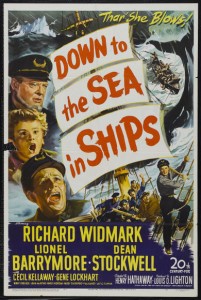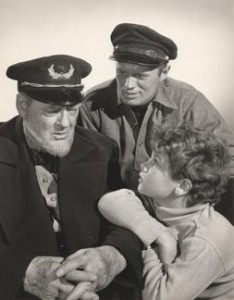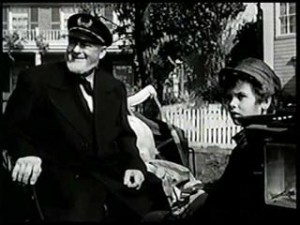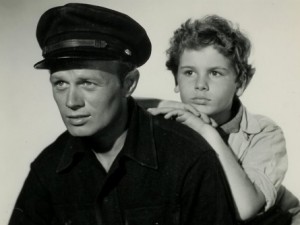
Thar She Blows!
Richard Widmark never, for some reason, strikes me as a tremendous presence on film, even though he was a tremendous star, particularly in the 1950s. Perhaps my perception correlates with the slight dearth of DVD and online offerings featuring him. And he was not blessed with the finest in material as none of his pictures are really household names. Perhaps most well known are The Alamo, Cheyenne Autumn, and How the West Was Won.
Recently I watched one of Widmark’s earliest films, 1949’s Down to the Sea in Ships. It is one of his earliest and also one of his lesser known, not even being available on DVD or online as of this writing. (At this point, why wouldn’t everything be available online?) Once in a great while you can catch it on TCM however.
 On the surface Down to the Sea in Ships is a simple whaling story set in the late 19th Century. Lionel Barrymore, in one of his last roles plays Captain Bering Joy (great name), a well worn Captain nearing retirement and quite set in his perceptions of the right way to do things. Richard Widmark, who does not appear for the first few reels, is his First Mate, Dan Lunceford. Lunceford is everything Captain Joy is not.
On the surface Down to the Sea in Ships is a simple whaling story set in the late 19th Century. Lionel Barrymore, in one of his last roles plays Captain Bering Joy (great name), a well worn Captain nearing retirement and quite set in his perceptions of the right way to do things. Richard Widmark, who does not appear for the first few reels, is his First Mate, Dan Lunceford. Lunceford is everything Captain Joy is not.
Whereas Joy’s greatest asset is his wisdom and experience, Lunceford’s is academic training and innovation. Joy’s strength lies in his reliance on tradition, and the ways he has always done things. Lunceford pushes the envelope and thinks outside the box. When first introduced to his future Captain, Lunceford details his studies, including several relevant fields including marine biology. Captain Joy merely states “now that marine whatchamacallit is something I’d like to hear more about.” With Barrymore’s deadpan delivery it is challenging to tell if this is sarcasm or sincerity, but my guess would be with the former, given Captain Joy’s pedigree on the high seas.
To round out the leading cast members is Dean Stockwell, who plays Captain Joy’s young grandson Jed Joy. Jed becomes the point of contention between the Captain and first mate for the balance of the picture, but it is really much more than that. It is the challenge of taking on the new while incorporating the old – rather than forgoing it entirely as Jed’s fine grandfather fears.
In the repertoire of the famed director Henry Hathaway, Down to the Sea in Ships comes right after Call Northside 777 and before The Black Rose. So roughly halfway through his long career. Hathaway does a fantastic job in conveying a great sense of action (the action scenes are amazing for the time) and leaving the symbolism of the picture somewhat subtle. Almost the entire picture happens on board a contemporary whaler.
 It is odd, though perhaps intentional, that the short period between the two voyages of the fine Captain Joy- the only part of the film of any length which occurs on land – is disjointed and, to be honest, a bit shallow. The conversation during this scene between the Captain and his grandson shows the limits of Captain Joy’s wisdom, making it clear that the benefits of his lengthy experience end once he disembarks. It also adds fuel to the dichotomy which occurs later with Widmark regarding the boys education. Captain Joy is show literally memorizing from a reference book answers to Jed’s questions. Later on it becomes clear that First Mate Lunceford would immediately be able to answer.
It is odd, though perhaps intentional, that the short period between the two voyages of the fine Captain Joy- the only part of the film of any length which occurs on land – is disjointed and, to be honest, a bit shallow. The conversation during this scene between the Captain and his grandson shows the limits of Captain Joy’s wisdom, making it clear that the benefits of his lengthy experience end once he disembarks. It also adds fuel to the dichotomy which occurs later with Widmark regarding the boys education. Captain Joy is show literally memorizing from a reference book answers to Jed’s questions. Later on it becomes clear that First Mate Lunceford would immediately be able to answer.
The picture as you can imagine has multiple layers, which with increasingly rare exceptions, are not present in the films of today. Even though Widmark gets top billing, in my estimation Barrymore steals the picture from under him with his fine characterization. And this given a strong performance from Widmark. In many ways, Captain Joy recaps some of the same aspects of Barrymore’s much earlier role in Captains Courageous.
It is strange to me why in this day so many good films are still not available to the general public in any convenient means. Surely at this point films like Down to the Sea in Ships don’t merit (and won’t get) a release on standard DVD, much less blu-ray.
 But why can’t most any film be rented or purchased from iTunes (my choice) or Netflix or the like? Surely most have never even heard of these films and fewer still would anticipate remastering or restoring such an obscure title. I’m no online genius but it seems the costs to 20th Century Fox would be pretty minimal to put this up on iTunes or something similar.
But why can’t most any film be rented or purchased from iTunes (my choice) or Netflix or the like? Surely most have never even heard of these films and fewer still would anticipate remastering or restoring such an obscure title. I’m no online genius but it seems the costs to 20th Century Fox would be pretty minimal to put this up on iTunes or something similar.
There are simply too many folks (well, within our little niche) who want to see these films but simply can’t. Shame on the studios.
This is a charming film that will both interest adults and the children and is good family fare. If you can snag it from TCM do so. It is well worth it. You shan’t regret it.